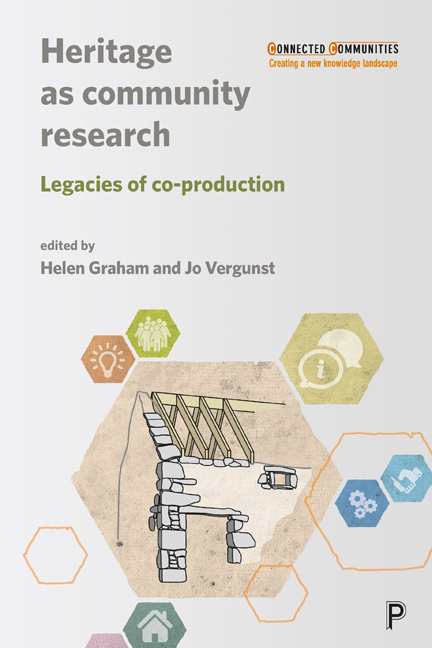eight - From researching heritage to action heritage
Published online by Cambridge University Press: 27 April 2022
Summary
Introduction
During 2012 and 2013, Researching Community Heritage (RCH) brought together community researchers in South Yorkshire and Derbyshire with a team of staff and students from the University of Sheffield to find out more about our local and regional heritage. Community and university researchers shared their expertise as both specialists in academic subjects and specialists in the places and communities where they live.
A programme of workshops during the first year led to over 30 applications to the Heritage Lottery Fund's (HLF’s) All Our Stories grant scheme. In many cases, the university researchers acted as advisors for these applications and the community researchers brought the ideas, inspiration and leadership. In other projects, the community and university researchers jointly devised the proposal, offering a shared intellectual and personal vision for the research.
We were delighted when 14 of the projects were offered funding by the HLF, and we devoted the second year of RCH to making these projects a success. Working together, we learned about our region and its history looking at both the fine grain of everyday lives (for instance, the pastimes and social lives of people in the Sheffield suburb of Heeley during the last hundred years) and the broader processes that were shaped by and that, in turn, shaped our communities (such as military training on Langsett Moor during the Second World War).
In this chapter, we present a few of the RCH projects in more depth, and introduce the activities of narrative, creative practice and engaged learning that were shared ways of working during the research. We reflect on how these activities engaged the participants with heritage as a creative and social process, rather than heritage as a body of immutable facts about the past. Through this attentiveness to process during RCH, we became conscious of how researching was a means of enfranchising participants, and of revealing and contesting inequalities within and beyond the projects. Inspired by Nancy Fraser's (2000) thinking on social justice and the application of her ideas in heritage studies (Waterton and Smith, 2010), we propose an ‘action heritage’ framework for undertaking co‑produced heritage research. We began RCH with the seemingly straightforward aim of helping local community organisations find out more about their heritage.
- Type
- Chapter
- Information
- Heritage as Community ResearchLegacies of Co-production, pp. 171 - 186Publisher: Bristol University PressPrint publication year: 2019



